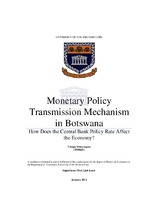| dc.description.abstract | The transmission mechanism of monetary policy has generated a substantial amount of interest in economic research in many countries, with most studies focusing on how a change in monetary policy stance, usually defined as an exogenous shock in a short-term interest rate, affects the economy at a national level, with changes in output, inflation and exchange rates being the key variables under investigation. This study adopts a similar analysis, with the general objective of examining the effectiveness of monetary policy in Botswana. Specifically, this study aims at finding out how the central bank rate affects inflation in Botswana and the duration of its effects on economic variables in Botswana. The study adopts the recursive VAR methodology, using quarterly data from 1995 quarter one to 2009 quarter four. The results show that monetary policy is most effective via the interest rate channel in Botswana, followed by the credit channel and then the exchange rate channel. In addition, the results reflect that the economy reacts to monetary policy actions with a one period lag, with the effect lasting for seven quarters. | en_US |

